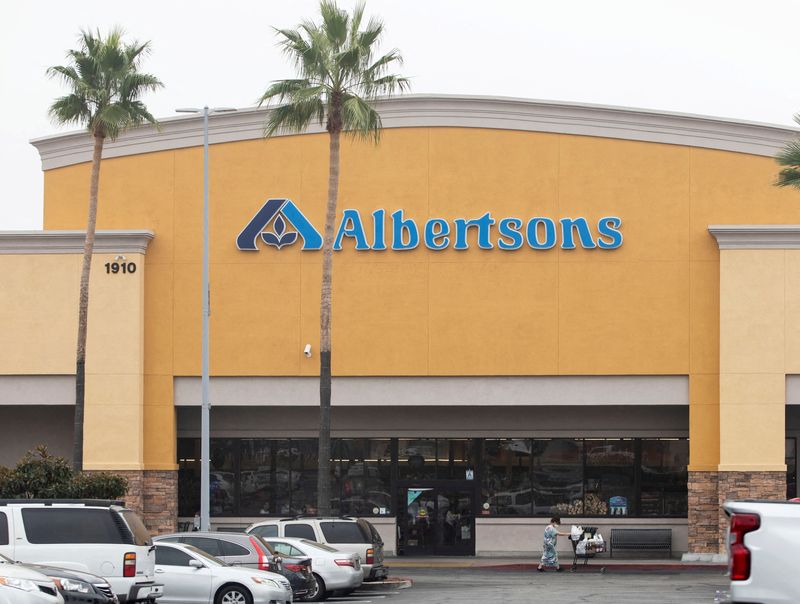By Abigail Summerville and Anirban Sen
NEW YORK (Reuters) - Kroger (NYSE:KR) Co and Albertsons Cos Inc are willing to divest up to 650 supermarket stores to secure regulatory clearance for their $24.6 billion deal, but if they cannot find buyers they have an unusual spin-off structure up their sleeves.
The two largest U.S. operators of stores dedicated to groceries said on Friday they may divest some stores by placing them in a new company that will be owned by Albertsons shareholders. They said the spun-off company could have between 100 and 375 stores.
The structure is intended to give the companies a stronger hand in negotiations with the Federal Trade Commission (FTC), the U.S. regulator that can sue to block the deal if it believes it will be detrimental to consumers at a time of rampant price inflation.
Companies that agree to merge can take months to divest assets as they try to appease antitrust regulators. The spin-out structure would make it easier and faster for Kroger and Albertsons to divest stores if they cannot easily sell them outright, people familiar with the arrangement said.
The companies may struggle to find many buyers because Albertsons' stores are unionized, making them less attractive to potential bidders such as private equity firms. Kroger and Albertsons are likely to shed their least profitable stores and keep the best ones to themselves, analysts said.
Kroger and Albertsons did not immediately respond to requests for comment.
A previous merger involving Albertsons offers a cautionary tale to potential buyers. When Albertsons agreed to acquire peer Safeway for more than $9 billion in 2014, it subsequently won regulatory backing by signing a deal to sell 146 stores to West Coast regional grocer Haggen for $300 million. Haggen filed for bankruptcy months later and blamed the deal with Albertsons for its demise. Albertsons then agreed to buy many of the Haggen stores back for $300 million.
To be sure, at least one competitor of Albertsons and Kroger is expected to take a close look at their potential divestitures. Ahold Delhaize Chief Executive Frans Muller has said his company, the fourth-largest player in the U.S. grocery sector, has a "very active" mergers and acquisitions strategy and that it is looking to expand in the western United States. That region contains the most store-overlap between Kroger and Albertsons and is where divestitures are most likely, according to analysts.
Ahold did not immediately respond to requests for comment.
"Any stores that we need to divest, we would intend to fully market them, and we will look at SpinCo as one option within that plan," Kroger's chief financial officer, Gary Millerchip, told analysts on a call on Friday, referring to the company that Kroger and Albertsons plan to form which encompasses the spun-off stores.
Between them, Kroger and Albertsons now operate a total of 4,996 stores. Their contract specifies that Kroger does not have to agree to divestitures exceeding 650 stores to appease regulators. If their deal falls through, Kroger will then owe Albertsons a breakup fee of $600 million.
FTC CHALLENGES
The FTC, under Chair Lina Khan, has sued to block six mergers in the past year, sometimes successfully. It forced U.S. arms maker Lockheed Martin Corp (NYSE:LMT) to abandon its acquisition of rocket engine maker Aerojet Rocketdyne Holdings (NYSE:AJRD) Inc and forced chipmaker Nvidia (NASDAQ:NVDA) Corp to walk away from its purchase of SoftBank Group Corp's Arm Ltd.
But the agency also suffered a bruising defeat last month, when a U.S. administrative judge ruled against its challenge to genetic analysis equipment manufacturer Illumina Inc (NASDAQ:ILMN)'s acquisition of cancer detection test maker Grail Inc, finding that the deal would not hurt competition. The FTC's counterpart in the European Union was successful in challenging the Grail deal, a decision Illumina has appealed.
Khan, an appointee of U.S. President Joe Biden and former law professor, has been highly skeptical of the purported benefits of big mergers to consumers and has criticized the FTC's handling of Albertsons' deal with Safeway. In a Harvard Law & Policy Review article published five years ago, she wrote that "even a casual observer could have predicted that Haggen would have great difficulty expanding its store fronts nearly ten-fold" following its deal with Albertsons, and argued that the antitrust remedy that was agreed "backfired".

The FTC declined to comment.
Kroger and Albertsons are mindful that any new company they create to take some of their stores has to be financially healthy, given what happened with Haggen, people who worked on their deal said. They intend for the spun-off company to not carry any debt, the sources added.